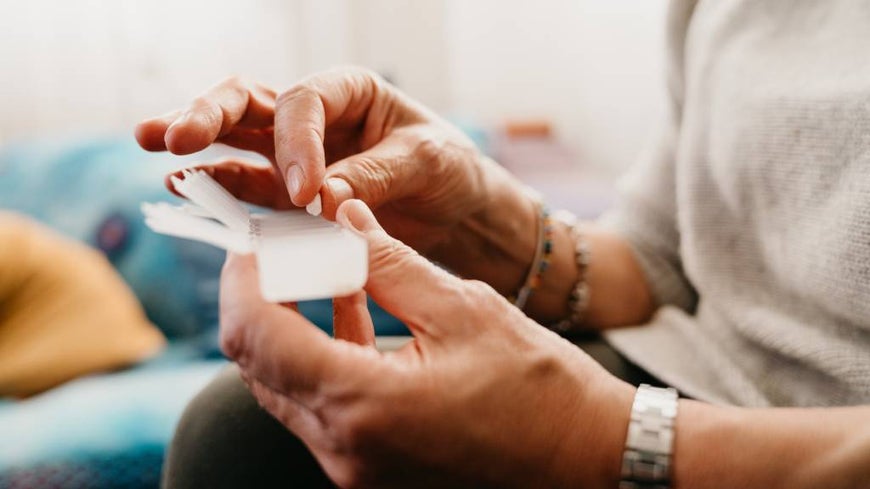Overdosing on prescription medicine: a bitter pill to swallow

Written by Monique Butterworth for Australian Seniors.
Consider this scenario: After a long day digging, weeding, and maintaining the garden, your lower back is killing you. A hot bath doesn’t relieve the pain, so you poke around the medicine cabinet looking for that packet of pills your doctor prescribed that helped you through an injury six months ago.
There it is! Endone, an opioid pain reliever containing oxycodone (classified as a drug of addiction). You pop two and pour yourself a large glass of shiraz as you make dinner. Then another glass. Next, it’s time to take your antidepressant. And perhaps a cold and flu tablet (often containing codeine, a ‘weak opioid’) for your scratchy throat.
The risk of accidental misuse
In itself, this one-off incident combining opioids, alcohol, and antidepressants might prove harmless – but it’s just one example of how easy it is to misuse medications.
Renae Beardmore, national vice-president of the Pharmaceutical Society of Australia (PSA), says an estimated 250,000 Australians are admitted to hospital each year because of problems related to their medicines, at a cost of about $1.4 billion. “In addition, 400,000 Australians present to emergency because of their medicines,” she says. PSA estimates that about half of these hospital admissions and emergency visits are preventable, as they’re due to issues like medication errors or inappropriate use.
“We know opioids are a problem and there have been unintentional deaths and overdoses,” Renae adds. “There are a lot of medicines where mixing with alcohol is contraindicated. And you should never take another person’s medicines, either.”
Over-the-counter medications – often seen as safer – also need to be respected. “People don’t think over-the-counter medicines can cause harm,” she says. “The more prescription medicines people take and then supplement with over-the-counter medicines, the more potential exists for medicine safety issues to occur.”
“We know opioids are a problem and there have been unintentional deaths and overdoses,” Renae adds. “There are a lot of medicines where mixing with alcohol is contraindicated. And you should never take another person’s medicines, either.”
Over-the-counter medications – often seen as safer – also need to be respected. “People don’t think over-the-counter medicines can cause harm,” she says. “The more prescription medicines people take and then supplement with over-the-counter medicines, the more potential exists for medicine safety issues to occur.”
The pain factor
Carol Bennett, CEO of national advocacy body Painaustralia, says more than a million Australians over 65 are living with chronic pain – a rate that’s almost twice as high as the working age population. “The most important issue is ensuring people have good knowledge of pain and how to manage it,” says Carol. “And not just with medication but how to manage pain in a holistic way, which is more effective than just using medication.
“Pain medications such as opioids combined with antidepressants or antipsychotics – the risk of overdose goes up dramatically,” she adds.
John Ryan, CEO of the Penington Institute, which seeks to improve community safety in relation to drugs, agrees. “Not everyone that uses prescription opioids becomes addicted, but there is a risk, particularly with people who have pre-existing mental health issues. They’re more vulnerable to developing a dependency on those medications and that’s problematic.”
Recognising an overdose
A recent pilot program called ‘Take-home Naloxone’ made the life-saving drug, Naloxone, free and available without prescription in three states (NSW, South Australia and Western Australia) for people who are at risk of an opioid overdose. Naloxone can temporarily reverse the dangerous respiratory depressant effects of an opioid overdose, or adverse reaction, if administered by carers, friends or family members while waiting for paramedics to arrive.
Learning how to spot a potential overdose is just as important as having the tools to deal with it. “In an extreme situation, it’s someone you simply can’t wake up,” says John.
“Call the ambulance,” he advises. “Do not hesitate to call 000. Ideally, you will have Naloxone on hand to administer until paramedics arrive.
“I have spoken to lots of people who didn’t ring 000 because they didn’t want to escalate the problem. Treat it with the gravity it deserves. It is a life and death situation,” says John.
Developments in technology, such as the Real Time Prescription Monitoring (RTPM) system, can help ensure better patient outcomes. RTPM is a national system designed to monitor the prescribing and dispensing of controlled medicines with the aim of reducing their misuse and limiting ‘prescription shopping’ or ‘doctor shopping’. It provides information to doctors and pharmacists about a patient’s history and use of controlled medicines.
How to take responsibility
As advised by John Ryan, Penington Institute.
Listen to the experts
Pharmaceutical drugs are basically safe and effective as long as they’re used as advised. Honest conversations with your doctor are vitally important and they’re not the conversations people are having enough of.
Be honest
Doctors rely on their patients telling them the whole truth, warts, and all. If you’re exceeding recommended alcohol guidelines or consuming cannabis, you need to tell your doctor.
Don’t stockpile
You can take your expired or unwanted medicines back to any local pharmacy across Australia to dispose of free of charge, thanks to the RUM Project [Return Unwanted Medicines], a government backed, non-profit initiative.
The numbers
- 1,121 opioid-induced deaths among Australians in 2019.
- 873 of these deaths were considered unintentional.
- 632 deaths were attributed to pharmaceutical opioids.
- 547 deaths were people aged over 45.
Source: National Drug & Alcohol Research Centre, University of NSW.
21 Mar 2022